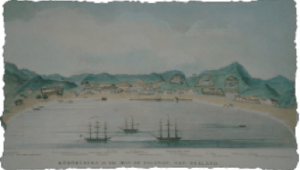
Land Issues



After 1840, land-hungry settlers flooded into New Zealand. Private land agents, notably the New Zealand Company, purchased land in bulk and their advertising campaigns convinced many to emigrate from Britain. The towns of Auckland, Wellington, and Nelson grew rapidly.
Land was at the heart of everything, and Ngāpuhi were becoming very worried about losing theirs. Certain government policies were blatantly unfair, such as the policy regarding “surplus land”. The policy applied to pre-treaty land sales (where the buyer was a pākehā). Upon investigation, many claims of ownership were found to be to be invalid or excessive. The problem was this: land, which was not awarded to the pākehā claimant was presumed to be owned by the government. It was not returned to Māori. The issue was a key driver of resentment among Ngāpuhi, which eventually led to the Northern War.
It is but too evident that the Europeans will possess themselves of their [the Natives] country – some of them are pretty well aware.
Richard Davis, CMS missionary, 184
The policy of “pre-emption” was another land issue, which angered Māori. Under the terms of the Treaty, Māori could not sell their land privately (they could only sell it to the Crown). It was infuriating for Māori to see land they’d sold to the government for a very cheap price being on-sold to settlers for a great deal more. It was also a problem for Māori who wanted to sell land that the government didn’t want to buy. In 1844, the Crown began to grant waivers to the policy of pre-emption, in an attempt to smooth over Māori discontent.



